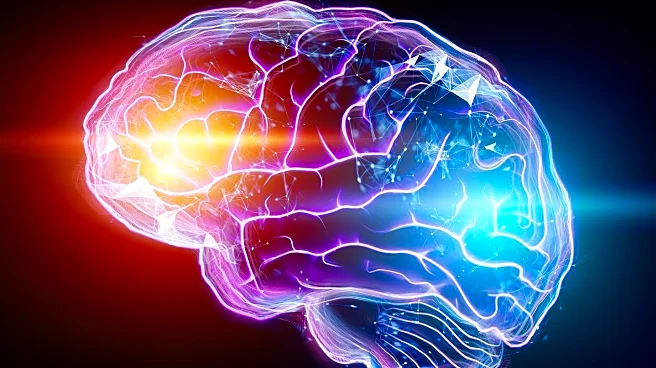What's Happening?
A recent study published in the Journal of Magnetic Resonance Imaging has found that long-term users of ayahuasca, a psychoactive brew traditionally used in Amazonian rituals, exhibit distinct patterns
of emotional brain activity and increased psychological resilience. The research involved brain imaging of 38 healthy adult males in Brazil, half of whom were long-term ayahuasca users. These users had consumed the brew at least 36 times over a year, typically in structured religious ceremonies. The study utilized functional magnetic resonance imaging to assess emotional processing tasks, revealing that ayahuasca users showed higher resilience and distinct brain activity patterns compared to non-users. The findings suggest that regular, ritualized use of ayahuasca may lead to adaptive changes in emotional processing and psychological resilience.
Why It's Important?
The study's findings are significant as they offer preliminary evidence that long-term ayahuasca use may have lasting positive effects on emotional processing and resilience. This could have implications for mental health treatments, particularly in enhancing emotional adaptability and coping mechanisms. The research highlights the potential therapeutic benefits of ayahuasca, which has been of growing interest among scientists and spiritual communities. However, the study also emphasizes the importance of structured and guided use, cautioning against widespread use without proper context and preparation. The results contribute to a balanced understanding of ayahuasca's risks and benefits, potentially informing future regulatory decisions and therapeutic applications.
What's Next?
Future research is needed to explore the broader applicability of these findings across different populations and settings. The study's authors plan to expand their investigations using newer technologies, such as liquid biomarkers and advanced neuroimaging techniques, to further understand ayahuasca's effects on the brain and emotional health. Larger and more diverse samples could help clarify whether the observed brain patterns are consistent in clinical settings or other structured environments. The researchers aim to bridge traditional knowledge with modern neuroscience, potentially offering new paths to healing for those experiencing emotional suffering.
Beyond the Headlines
The study underscores the importance of context in the use of ayahuasca, suggesting that the structured spiritual communities in which the brew is consumed play a crucial role in shaping outcomes. This highlights ethical considerations regarding the use of psychoactive substances and the need for respect and proper integration. The research also challenges existing stigmas and prejudices, advocating for evidence-based understanding and respect for traditional wisdom. By merging ancestral knowledge with scientific inquiry, the study aims to make visible the benefits of ayahuasca that have long been invisible to some.









